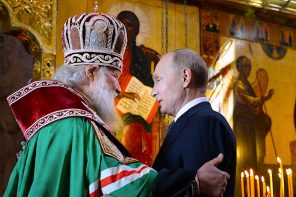Yesterday, my mother called me in a panic. “Who won the game?!” I am looking online right now and I see that it is tied at fifteen, but I don’t know if that is a live feed. “Is it over?” Her voice was quivering with anxiety and guilt: “I was having lunch with your uncle—I forgot the game was on!” My mother waited with bated breath to hear if her favorite NFL quarterback—indeed, probably the only NFL quarterback in history she could name—had come through in his first and much anticipated start of the 2011-12 Denver Broncos season.
My mother might not be Tim Tebow’s most typical fan, but she shares many traits with the growing throngs of people who make up his already vast fan base. She breaks the mold in terms of geography and football knowledge. She is from Canada, not the American South, and before I started attending the University of Florida as a doctoral student in religion, she had never been concerned with anyone’s “throwing accuracy,” nor would she have known that it is tough for a running quarterback to make it in the passing-dominated NFL. She is, though, an evangelical Christian and that qualifies her for Tebowmania—even if only via internet connections in Canada.
Evangelical Protestants have historically opposed the idea of sainthood à la Roman Catholicism or Eastern Orthodoxy. Even people who aren’t familiar with all the historical and theological particulars of the Reformation—that 16th-century historical movement that led some eager Protestants to smash images of saints with bellowing cries against “idolatry”—know that many Protestants are quite selective with religious images. Protestants have been especially wary of images of saints because this visual piety strikes them as an affront to a God who they claim demands singular worship and relationship. A crowd of visual intermediaries, as the iconoclastic Protestant logic goes, could muddle the face of Jesus; the only image some Protestants will display in their homes and churches.
But then there’s Tim Tebow, a man with patent strengths and glaring football weakness; a man who fits the last-shall-be-first theme of so many stories about saints.
Doubters said Tebow would never be selected in the first round of the NFL draft. He was chosen in the first round anyway. Still, the coach, Josh McDaniel, was fired after Tebow’s rookie season and Tebow was unceremoniously benched under the helm of current coach, John Fox, for the first four games of Tebow’s second season; that is, until Fox finally seemed to relent to unyielding cries from the Tebow-faithful in Denver. Fox inserted Tebow in the second half of their fourth game as the Broncos trailed the Chargers by fourteen. Tebow led a crazy, sprawling comeback that fell just short of victory, but ended with a crescendo of Bronco praise: “Tebow! Tebow!”
Yesterday, against the hapless Miami Dolphins who were 0 and 5 going into the game, Tebow started and spent three quarters playing the before role in the saint narrative. Throwing errant passes, misreading defensive coverage, and threatening to leave the Broncos with their first scoreless game since 1992, he looked weak and bewildered. With a little over two minutes left, all heaven broke loose. In myths, the importance of story dwarves the historical sequence, which, in this case, is that Tebow won! What some have deemed (quite loosely, I might add) a “miracle” included two Tebow tosses for touchdowns, a Tebow run for a two-point conversion, a successful onside kick (that almost never happens in the NFL), and a Dolphin’s sack-fumble. Overtime included a 52-yard field goal, which brought the Broncos their 18-15 win.
Tebow seemed to have an uncanny sense that the camera had caught him when he ceremonially genuflected. The difference between his gesture and other athletic signals to the divine, however, is that Tebow has made clear in every bestselling book (he just has one so far, at the age of 23) and every interview he gives that his devotion is particular: that Jesus Christ is his “Lord and Savior.” Evangelicals like my mother don’t need that text anymore to perceive something divine in his continuingly improbable story. Like evangelicals around the globe, she has an abundant archive of internet footage to download at her convenience as a visual reminder that her personal stories of comeback and belief are part of a broader narrative in which God helps the underdog in this life. Find a Catholic or Eastern Orthodox Christian and they will tell you that this is what saints and icons have done all along.
My mom called me back after her first anxious call. With calm assurance, she said, “They won. The Lord is with him, Sean.” And also with you.




